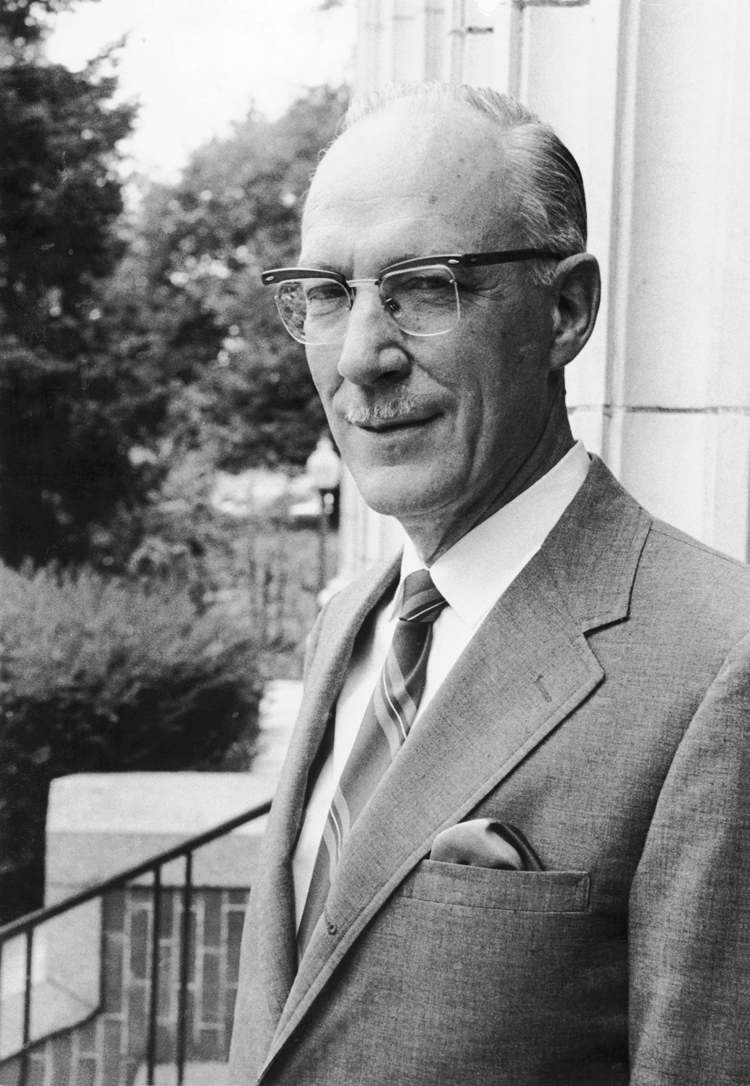- Born March 30, 1910, Frontier County, Nebraska
- Died June 28, 2005, Eugene, Oregon
- Married Opal Routh in 1932 in Pasadena; 3 daughters: Laurie, Virginia and Suzanne
- Bachelor's degree, Pasadena College, 1931
- Master's degree in speech, University of Southern California, 1935
- PhD in speech, University of Southern California, 1943
- San Jos� State College President from 1964 to 1969
- As a child, Clark enjoyed reading and sports. The local Carnegie public library only allowed patrons to check out two books at a time. Clark maximized this limit by reading two books every day.
- During his SJSC inauguration, Clark stated: "Bigness is amorphous, diffused, a mass in which the individual lacks identity and is but a particle in a lonely crowd. ... The tragedy of the last thirty years is that we shaped education for the average and allowed the brighter students to just drift along. But now, we must raise our standards higher. This is a basic essential not only in education, but in a democratic society."
- Enrollment rose to 20,000 during Clark's first year at SJSC. To address the overcrowding, Clark raised admission standards, moved up application deadlines, hired more faculty and worked to construct more buildings.
- Clark worked with students, employees, alums and others to help save Tower Hall that was to be torn down along with the quadrangle and auditorium. A 50 foot telegram with over 3,500 signatures was sent to Governor Brown asking for the Tower to be saved. These efforts were successful and Tower Hall and Morris Dailey Auditorium were left out of the demolition plans. After the demolition and restoration of Tower Hall and a lawn area around it, President Clark moved the president's office and a few other administrative offices into the building.
- Clark worked with the relatively new Academic Council (eventually to become the Academic Senate) to work with faculty on policy matters. Clark began the tradition of having the Council chair give remarks at the President's fall welcome back address.
- Clark's presidency at SJSC was during a time period of war protests, civil rights protests, and a faculty strike (1968). Clark was president when students Tommie Smith and John Carlos raised their gloved fists after receiving their medals at the Olympics in Mexico City. Clark supported and praised the students upon their return. Clark stated: "All Americans should be proud of their achievements. ... I regret that our treatment of our Black athletes has been such as to prompt them to feel they must use the Olympic Games to communicate their real concern for Blacks in America." Clark faced opposition from some elected officials for his understanding and support of student and faculty concerns.
- Clark created New College at SJSC - a liberal arts program focused on the sciences and humanities. It was designed by a committee of faculty and students and was a separate college.
- University of Oregon career:
- Assistant Professor of Speech, starting in 1943
- Chairman of the Speech Department in 1954
- Dean of the College of Liberal Arts in 1956
- Dean of the Faculty, prior to joining SJSC
- President from 1969 to 1975
- The Honors College he created in 1959 (the first in the U.S.) was named for him in 1975 when he retired as president of the university
- In their book, Washington Square 1857 - 1979, authors and historians Benjamin F. Gilbert and Charles Burdick summarize Clark's impact on SJSU as follows: "Clark's five years had been eventful ones. Despite the notoriety of short-lived violence, his major contributions were many. In the curriculum he introduced a spirit of adventure, of meaningfulness, of curiosity; in his administrative changes he fostered a sense of mutual cooperation, of functional purpose, of directional order; in his community relations he established an awareness of meaningful requirements, of general needs, of communal hopes. Perhaps his major contribution was an intangible, indefinable spirit. He provided a sense of pride for everyone associated with the institution. He stood for quality, for improvement. When he departed from Washington Square, the foundation stones for university status were firmly and visibly in place."
- SJSU Academic Senate Sense-of-the-Senate resolution honoring Dr. Clark (August 2005)
Sources: Washington Square 1857 - 1979 by Gilbert and Burdick, pages 169 - 182; San Jos� State University - An Interpretive History 1950 - 2000, by James P. Walsh; Notes on the History of the Academic Senate - San Jos� State University, by Ted Norton; Inside Oregon - press release of the University of Oregon, 7/7/05; "R. Clark, SJS chief in '60's tumult, dies," San Jose Mercury News, 6/29/05, page 3A.

Source: University of Oregon
Clark
Hall at SJSU
(previously Clark Library)
